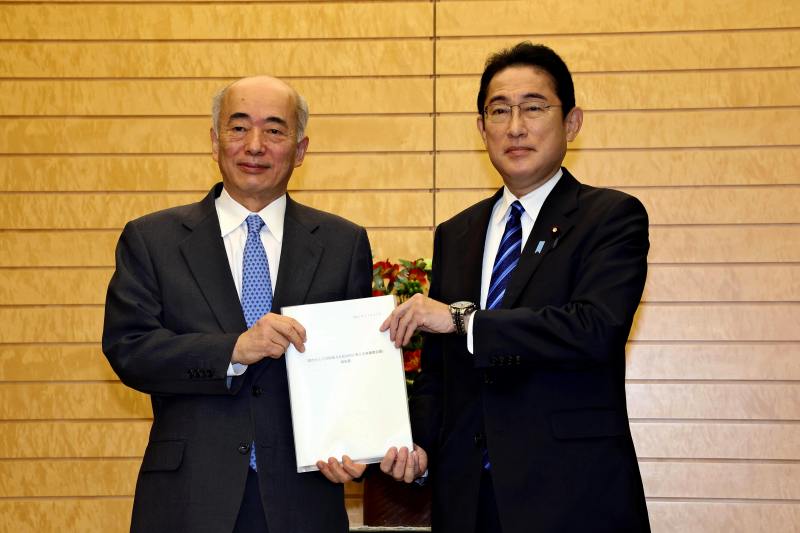
Kenichiro Sasae, left, chair of the Advisory Panel to Comprehensively Discuss Defense Capabilities as National Strength, hands a proposal to Prime Minister Fumio Kishida at the Prime Minister’s Office on Tuesday.
21:00 JST, November 23, 2022
An expert panel’s proposal has supported the government’s position on the possession of counterattack capabilities and the crafting of a budget framework that includes security-related research and development.
The Advisory Panel to Comprehensively Discuss Defense Capabilities as National Strength presented its proposal to Prime Minister Fumio Kishida on Tuesday.
“It is the top-priority obligation for the government and the ruling parties to strengthen deterrence and response capabilities so as to resolutely defend our country,” Kishida said at a policy roundtable of the government and ruling coalition he attended immediately after receiving the panel’s proposal.
He also pointed out that Japan’s security environment is “rapidly becoming more severe,” with neighbors China becoming increasingly hegemonic, Russia having invaded Ukraine, and North Korea having repeatedly launched ballistic missiles.
The proposal stated that the purpose of strengthening defense capabilities is to “secure deterrence to prevent contingencies from occurring” and called for specific measures to be taken. The main pillar of the proposal is the possession of counterattack capabilities to destroy an enemy’s missile launch sites and other facilities for self-defense.
What the experts insisted on in their proposal was to swiftly secure the effectiveness of counterattack capabilities. In addition to the plan to improve domestically produced missiles, the experts stressed that “Japan should equip itself with a sufficient number of missiles as early as possible, with the next five years in mind” by purchasing foreign-made missiles that have high reliability.
In 2027, the Chinese military will celebrate the 100th anniversary of its founding. Some have speculated that is the time when Chinese President Xi Jinping will take steps toward forcibly unifying Taiwan with the mainland.
“There is a considerable sense of urgency,” said a senior Japanese Defense Ministry official.
The government is proceeding with improvements, such as extending the shooting range of the Self-Defense Forces’ Type 12 surface-to-ship missile, but there could be delays. Kept in mind is the Tomahawk, a U.S.-made cruise missile that the U.S. military has proven in numerous battles to be effective.
The panel proposal also attached importance to improving sustainment and urged “the steady development of those segments that would constitute the foundation of fighting capability,” including the securing of ammunition.
It also included considering the creation of a chief of joint operations to command the Ground, Maritime, and Air Self-Defense Forces. At the same time, the proposal requested the Defense Ministry to conduct a thorough “scrap-and-build” program, including a review of defense equipment.
Dual use of cutting-edge research
The panel focused on the development of an environment for cutting-edge research to be used in the defense sector. The proposal positioned artificial intelligence, quantum, cyber and other technologies as “the foundation of economic development as well as defense capability,” and emphasized the importance of “national investment.”
Internationally, the trend is for academia, industry and government to work together to foster technologies for civilian and defense purposes. Japan is lagging in this dual-use respect, however, as the country’s academic circles remain averse to its involvement in the security sphere. To make up for this delay, the proposal states that “the cooperation of a wide range of researchers in cutting-edge technologies is indispensable.”
The panel also emphasized the need to break down the bureaucratic sectionalism among ministries and agencies in research and development and proposed the creation of a cross-ministerial framework for sharing the R&D needs of the Defense Ministry with other ministries and agencies. A budget framework to ensure such efforts should also be formulated.
Creating special venues on and off university campuses to encourage researchers to participate in dual-use research is also suggested. The panel has in mind an idea of establishing off-campus research centers, modeled on those in the United States and elsewhere.
Concerning the new budget framework for R&D, whose expenditures will be appropriated together with a security-related budget, the panel called for measures that would be tailored to Japan’s circumstances, referring to the standards set by the North Atlantic Treaty Organization. NATO allows alliance members to include expenses for their coast guard in their defense-related budget, so the government intends to include the Japan Coast Guard budget in security-related expenditures.
The proposal also positioned a significant improvement of cooperation between the JCG and MSDF as a key issue.
The rebuilding of the defense industry was also an important agenda item. The panel urged the government to take the lead in expanding defense equipment exports, saying that it would lead to stronger relations with the recipient countries and that it “will also be consistent with the principle of proactive pacifism.”
Top Articles in Politics
-

Japan PM Takaichi’s Cabinet Resigns en Masse
-

Sanae Takaichi Elected Prime Minister of Japan; Keeps All Cabinet Appointees from Previous Term
-

Japan’s Govt to Submit Road Map for Growth Strategy in March, PM Takaichi to Announce in Upcoming Policy Speech
-

LDP Wins Historic Landslide Victory
-

LDP Wins Landslide Victory, Secures Single-party Majority; Ruling Coalition with JIP Poised to Secure Over 300 seats (UPDATE 1)
JN ACCESS RANKING
-

Japan PM Takaichi’s Cabinet Resigns en Masse
-

Japan Institute to Use Domestic Commercial Optical Lattice Clock to Set Japan Standard Time
-

Israeli Ambassador to Japan Speaks about Japan’s Role in the Reconstruction of Gaza
-

Man Infected with Measles Reportedly Dined at Restaurant in Tokyo Station
-

Videos Plagiarized, Reposted with False Subtitles Claiming ‘Ryukyu Belongs to China’; Anti-China False Information Also Posted in Japan





















